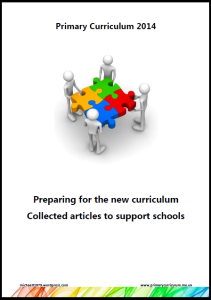Just over three years ago, in the early months of the coalition government, Michael Gove appointed an expert panel to advise him on the development of the National Curriculum. It included in its remit the requirement to consider “what, if anything, should replace existing attainment targets and level descriptors to define better the standards of attainment children should reach, and be assessed against, at various points through their education“.
In December 2011, (after some controversy) the Expert Panel reported and made some clear statements and recommendations:
We […] emphasise the importance of establishing a very direct and clear relationship between ‘that which is to be learned’ and all assessment (both formative and ongoing, through to periodic and summative)
Taking this approach has much greater technical and practical integrity, and is likely to improve both learning and assessment. The key challenge will be to write Attainment Targets that are as few and concise as possible in the choice and expression of ‘essential’ learning outcomes. We do not want to encourage the promulgation of huge numbers of atomistic and trivial statements of attainment that characterised earlier versions of the National Curriculum.
The focus of ‘standard attained’ should be on these specific elements, rather than a generalised notion of a level. In plain language, all assessment and other processes should bring people back to the content of the curriculum
As the research on feedback shows, summary reporting in the form of grades or levels is too general to unlock parental support for learning, for effective targeting of learning support, or for genuine recognition of the strengths and weaknesses of schools’ programmes
It seems quite clear that what was intended was an assessment structure which allowed attainment to be recorded with specific and clear reference to material covered and learned, that clear objective-focussed assessment would be more effective in all manners than levels or scores.
However, what we saw in the last few weeks proposed by the DfE for assessment at the end of each Key Stage, and implied for the intervening years, was a replacement of levels with scaled scores. Rather than moving from broad assessment focuses to specific one, the direction of travel has been reversed, moving from broad descriptors to unrelated figures. One can only presume that the members of the expert panel have long side given up any hope of their words being heeded, since so many of their recommendations have already been disregarded.
This leaves us at a worrying fork in the road, and a fork at which school leaders must decide whether to take the Secretary of State at his word – and take the responsibility he claims to offer for teachers to take the lead – or to be led by the department’s misdirection towards a strictly numerical threshold for recording achievement. The challenge is great. As schools are under increasing pressure to meet standards set by the department, many leaders will fear to tread in an innovative direction that is supported by the evidence, only later to find themselves castigated for doing so.
We might reasonably have expected by now that some guidance might have been given about assessment systems. The DfE have managed a measly single A4 sheet with vague statements of guidance which offers little. I suggest my own 7 Questions to ask of any new assessment scheme. Hopefully we might this week hear about who has been successful in applying for the rather tardy Assessment Innovation Fund, but even then, the time it will take for those schemes to come to useful fruition.
This is already a challenging time for schools, and government has made it no easier for us to chart a path through the stormy seas ahead. One thing is certain: as I have said many times before, we must as a profession take the Secretary of State and his department at their word.
Earlier this month, Liz Truss gave a speech about the freedoms the department intend to provide. Let’s take up the offer:
Teachers have more influence than ever over their own profession.
And that means they can focus on what really matters: a better education for our children.
Optimus Education Conferences: Effective Primary Assessment after Levels
I will be presenting a keynote speech on primary assessment after levels as part of a training conference organised by Optimus, which also features Mick Walker (former QCDA Director of Education), Caroline Barker (DfE Policy Lead for Assessment) and various other speakers from schools who are already working on alternative assessment schemes. For details of the day, see the link here.
Readers of this blog who wish to attend the conferences in either London (21 May) or Birmingham (18 June) can obtain a 20% discount by booking with promotional code: MTIDD




